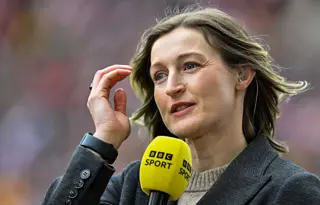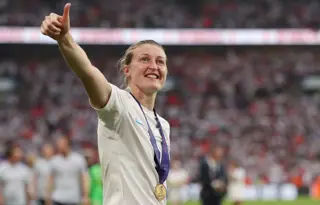News
Ellen White: Why centralising the player voice is crucial with ACL injury

- FIFPRO, the PFA, Nike, and Leeds Beckett University are collaborating to accelerate research into reducing ACL injuries and increasing player availability
- The partners of ‘Project ACL’ will work with clubs and players in the FA WSL to better understand their current working environment and provide solutions to support the reduction of ACL injuries
- Former England international Ellen White shares her experiences of suffering two ACL injuries and tells us why Project ACL can make a difference
Ellen White enjoyed a storied career that began as a 16-year-old at Chelsea in 2005 and ended in the summer of 2022 with England’s UEFA Women’s EURO triumph at Wembley.
Though White experienced the highs of winning honours at club and international level, whether in an Arsenal, Manchester City or England shirt, the prolific forward also experienced two Anterior Cruciate Ligament (ACL) injuries.
With players rightly calling for more research, FIFPRO, the Professional Footballers Association, Nike, and Leeds Beckett University are collaborating to accelerate research into reducing ACL injuries and increasing player availability.
The partners of ‘Project ACL’ will work proactively with clubs and players in the FA Women’s Super League (FA WSL) to better understand their current working environment, identify best practice and provide solutions to support the reduction of ACL injuries.
FIFPRO caught up with White, now working as a pundit after a successful playing career where she amassed 113 international caps, to hear about her experiences of suffering two ACL injuries and why Project ACL can grow the game's sustainability.
FIFPRO: Ellen, why is Project ACL significant?
Ellen White: This project is so important because it hasn’t been done before. We’ve been crying out for it for so long, and I feel like having FIFPRO, the PFA, Leeds Beckett and Nike combining forces is a big statement. There are so many incredible people coming together to create something that is hopefully going to be transformative for women’s football, and also player-centred.
What is currently missing from the conversation around ACL injuries?
There are so many things that come into an ACL injury. At the moment, it seems like everyone's discussing menstrual cycle or hips, yet there’s so much more. It’s a whole spectrum of things that need to be looked at. We need to talk to players. What is their environment like? Are they doing prehab? Strength and conditioning? And if so, what does that look like? Is it individualised?
A lot of it comes down to wanting to be a professional footballer at the highest level. To do that, training facilities and support need to be the priority to enable players to go out and perform at the elite standard every week.

Can you describe your experiences with an ACL injury?
In 2014, I had my second ACL when at Notts County, having had my first aged 18 while playing for England U-19s. Despite being on a professional contract and training every day as a professional footballer, the club probably didn’t have the support, the facilities and the structure to support me with my ACL injury. Like with my first ACL, I was very fortunate to have England support me by funding my surgery, my rehab and the access I had to St George’s Park. But again, when I was 18, the support was from my national team and not my club.
By the time I reached the end of my career, at Manchester City in the WSL, I saw players getting more support through specialists abroad, which was different to my own experience. In my career, I feel like my experience was a bit of anomaly in the sense of being lucky to have England support me.
Why is it important that the player voice is heard on this issue?
The athletes are the ones that are, first and foremost, playing and promoting women’s football through performing at the highest level and putting their bodies on the line. Women’s football is a product that needs to be protected.
The product through the players has such a variety in experiences, especially within the WSL which has a wide range of players with such different profiles and experiences. To hear from these players is important – they are the ones living this, and they need to be able to perform at the highest level possible. They need the support, the environment and the culture.
Why is it important to base these recommendations on player experience and feedback?
When recommendations are player-led, it has more power. Players feel like they’ve created it and they will have a sense of the change they’re creating through living and breathing the sport. To see everyone have a voice and believe in this is something that I feel a real sense of achievement for having been a part of. You feel like there's some big, big people that want to make a change and collectively want to improve women's football.

